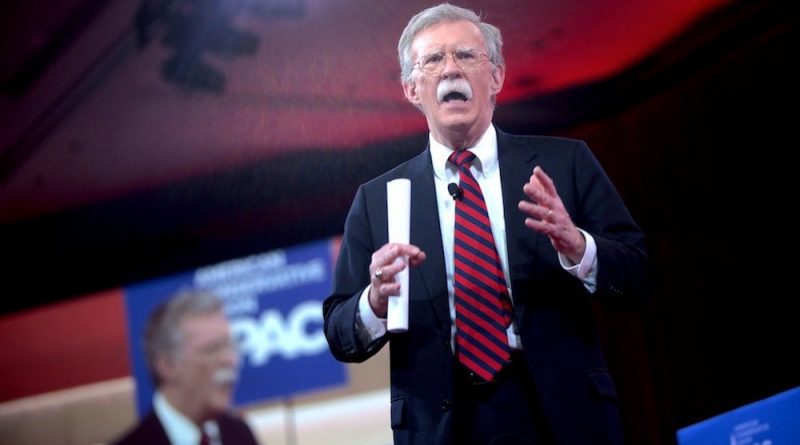Why America Needs John Bolton’s Leadership More Than Ever
By Catherine Doolan
Staff Writer
On March 22, President Donald Trump announced via Twitter that former U.S. Ambassador John Bolton will replace H.R. McMaster as National Security Adviser, effective April 9. Following this announcement, many from the Beltway establishment and mainstream media reacted in horror. The old, tired “warmonger” mantra that was often used against members of the Bush Administration was resurrected and applied to John Bolton. Critics of Bolton cast him as a mere Fox News contributor and an extremist for his strong positions on Iran, Russia, and North Korea.
On March 22 in an interview with Fox News’ Martha MacCallum, Bolton expounded on the duties that come with the job of national security adviser. He explained that a national security adviser needs to provide the President with all options available in addressing every national security situation, while also providing the advantages and disadvantages to each possible strategy.
After the President chooses which strategy he sees best, the national security adviser must oversee the implementation of the strategy. Bolton said that, “I’ve been in lots of bureaucracies, and I’ve seen the way that bureaucracies that don’t like decisions sit on them. I know my way around the corridors in Washington, and I think that role will also be important.”
John Bolton certainly is aware of the inner-workings of America’s complex foreign policy and national security machinery, as demonstrated by his service at Defense, Justice, and State Departments. Matthew Waxman, a professor at Columbia Law School and former senior policy official at the State and Defense departments, witnessed firsthand how John Bolton operates under pressure.
Waxman noted in an article for The Lawfare Institute that when working as President George W. Bush’s National Security Council staff, he witnessed Bolton “put loyalists in key vantage points and marginalize those he distrusts,” pick his battles wisely, and remain thorough and methodical in delivering policy.
During his time as UN Ambassador, Bolton became well known for his sharp criticism of the international organization as well as his bluntness. However, he still managed to receive several unanimous or near-unanimous votes on UN Security Council resolutions that addressed North Korea’s activities and Iran’s nuclear program.
Being able to receive the support of China and Russia for resolutions on these issues demonstrates Bolton’s diplomatic skill and negotiating capabilities. Bolton sought to score victories for the Bush Administration and protect American interests, and managed to do so even when navigating the very complex and bureaucratic UN system.
Ideologically, Bolton champions Reagan style realism and seeks to prioritize American interests. In an opinion piece for the New York Post, Hugh Hewitt described how after departing the Bush Administration, Bolton has effectively represented his ideological beliefs through the media and via political action committees. These ideals include Reaganism and the “Weinberger doctrine,” which is possessing “a vastly superior American military force deployed quickly, decisively and then withdrawn.”
Most importantly, John Bolton understands that in foreign policymaking, a wide variety of options exist when handling national security situations. Diplomatic negotiations can be the first option to pursue in addressing a conflict, as it avoids issues such as escalating tensions and costly military operations. However, if a country does not value diplomacy and does not prioritize peace, other options must be pursued.
Bolton is not naive and is well aware of nations’ ulterior motives. America needs successful foreign policy after years of foreign policy blunders. Bolton opposed the symbolic reset with Russia in 2009, which failed to prevent Russia’s invasion of Crimea and increased tensions in Eastern Europe, reports the Hill.
Bolton also opposed negotiating a nuclear deal with the world’s largest state sponsor of terrorism, which did not prevent ballistic missile threats against Israel and increased funding to insurgent groups that destabilize the Middle East, reports the National Review. Bolton never supported “strategic patience” with North Korea, which has only given the Pyongyang regime more time to develop nuclear weapons and threaten international peace, reports the Wall Street.
President Trump can credit his rise to power and shockwave election upset to his campaign message of putting the interests of the American people first. Bringing outsiders into Washington is a means to “drain the swamp,” bring about reform in the government and force the political elite to deliver meaningful policies to the very frustrated and disenchanted populus. However, in a Cabinet composed of many outsiders, appointing a Washington insider such John Bolton, who prioritizes American interests, will enable the Trump Administration to effectively bring about policy change in the nation’s vast and complicated foreign policy machinery.



